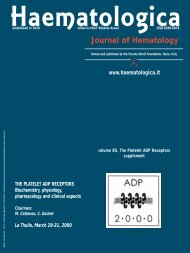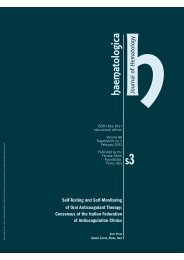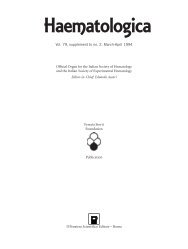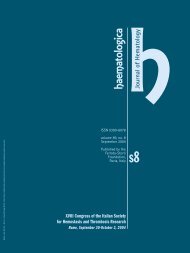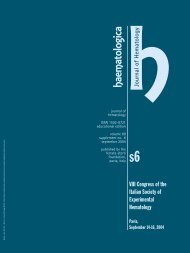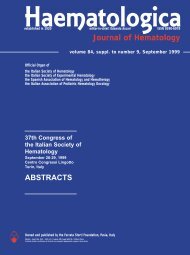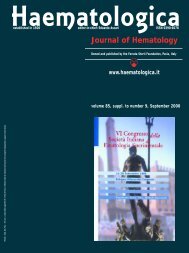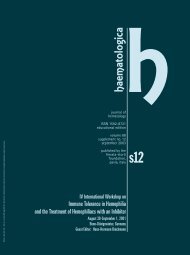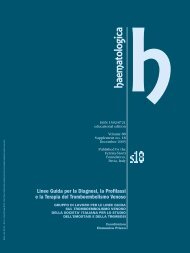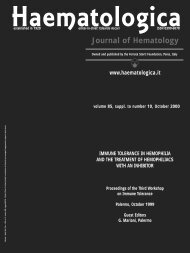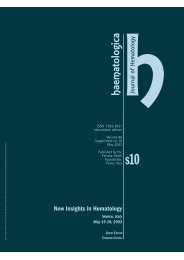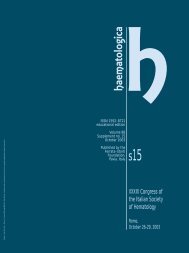Haematologica 2003 - Supplements
Haematologica 2003 - Supplements
Haematologica 2003 - Supplements
Create successful ePaper yourself
Turn your PDF publications into a flip-book with our unique Google optimized e-Paper software.
human myeloma cell line (HMCL) to another. Actually, Akt<br />
activation is highly dependent on either PTEN or CD45 phosphatase<br />
expression. PTEN is a recently identified tumor suppressor gene that<br />
is an important negative regulator controlling the Akt activation.<br />
Indeed, out of 26 HMCL only 2 of them do not express PTEN and<br />
have the strongest Akt activation in response to IGF-1. Among the 15<br />
myeloma cell lines which has been analyzed for Akt activation, 3<br />
expressed CD45 on 100% of cells (XG-1, XG2, MDN), 2 expressed<br />
both CD45+ and CD45- subpopulations (U266 and JJN-3) and 9 are<br />
completely negative for CD45 (LP-1, NCI-H926, OPM-2, ANBL-6,<br />
BCN, NAN-1, RPMI-8226, L363, JIM-3 and Delta47). The Akt<br />
response was significantly weaker for CD45+ or CD45+/- HMCL.<br />
On the other hand, the highest Akt activation was restricted to CD45-<br />
HMCL. Furthermore, the duration of Akt phosphorylation in<br />
response to IGF-1 is more durable in CD45- myeloma cell lines<br />
(>3hours) whereas a return to baseline level is reached as soon as 30<br />
min in CD45+ HMCL. Finally, the growth of CD45- HMCL is<br />
mainly or even totally controlled by the PI-3 Kinase pathway<br />
whereas that of CD45+ HMCL is modestly controlled by it.<br />
Altogether, the results suggest that CD45 as PTEN negatively<br />
regulate IGF-1-dependent activation of PI-3 Kinase. Since we<br />
recently demonstrated that patients lacking CD45 at diagnosis had a<br />
bad prognosis, strategies that block IGF-1R signaling and<br />
consequently Akt/PI-3Kinase pathway could be a priority in the<br />
treatment of CD45- MM patients.<br />
128<br />
Two NF-κB activation pathways mediate CD40 signals<br />
to promote primary myeloma cell survival<br />
Eunice N. Hatada, Ruben Niesvizky, Sarah Meeus and<br />
Selina Chen-Kiang<br />
Weill Medical College of Cornell University, New York, NY10021, USA<br />
Multiple myeloma cells represent plasma cell precursors which,<br />
as a result of prior oncogenic transformation, fail to fully<br />
differentiate to plasma cells and turn over by apoptosis. On this<br />
basis, we hypothesize that the survival of MM cells in the bone<br />
marrow is at least in part due to inappropriate retention of B cell<br />
surface receptors. One candidate is CD40, which we have<br />
recently demonstrated to be progressively reduced during normal<br />
B cell terminal differentiation. CD40 signaling in MM cells has<br />
been shown to correlate with IL-6 secretion, but its role in<br />
myeloma clonogenic colony formation remains controversial.<br />
To test our hypothesis, we have characterized the functional<br />
consequence and the pathway of CD40 signaling in freshly<br />
isolated bone marrow MM cells. Nearly all freshly isolated<br />
CD138+ MM cells (20/21) expressed CD40 at varying levels, and<br />
in 7 of them CD40 was expressed in the majority of cells (65-<br />
100%). Stimulation with CD40L protected MM cells from<br />
apoptosis ex vivo in 75% of the samples, and the degree of<br />
protection correlated with CD40 expression. These results<br />
support our hypothesis that most MM cells retain CD40<br />
expression and that the primary consequence of CD40 signaling<br />
is inhibition of apoptosis.<br />
Next, we determined the signaling pathway(s) that mediate CD40<br />
signals for MM cell survival. CD40 signaling in normal B cells leads<br />
activation of various NF-B transcription complexes and the<br />
downstream cell cycle and survival genes via the "classical" pathway,<br />
which requires degradation of the inhibitor of NF-κBs (IκB) by the<br />
ubiquitin-proteasome pathway. This "classical" pathway, notably the<br />
transcriptional activating NF-κB1 p50/p65 NF-κB complex, was<br />
activated in CD40 signaling in MM cells. Importantly, CD40<br />
signaling also activated NF-B2 p52 in MM cells through the newly<br />
discovered "alternative" pathway, which does not involve IκB<br />
degradation. The two NF-B signaling pathways are crucial for the<br />
survival of MM cells, because inhibition by proteasome inhibitors<br />
dramatically accelerated MM cell apoptosis.<br />
This study provides the first direct evidence that CD40 promotes<br />
MM cell survival through activation of both classical and<br />
alternative NF-κB signaling pathways. Our findings have<br />
important implications for the mechanism of MM cell survival,<br />
the timing of oncogenic transformation in MM pathogenesis, and<br />
the use of proteasome inhibitors and possibly CD40 antagonists<br />
for MM treatment. These will be discussed.<br />
Supported by NIH grants (CA 80204, AR49436) and a<br />
Specialized Center of Research for Myeloma grant by the<br />
Leukemia and Lymphoma Society of America.<br />
5.3 Drugs and signalling pathways<br />
129<br />
Selective receptor tyrosine kinase (RTK) inhibition<br />
downregulates paracrine IL-6 in myeloma - stroma<br />
crosstalk and induces apoptosis in t(4;14) myeloma<br />
cells: therapeutic implications.<br />
G. Bisping1, D. Wenning1, B. Dreyer1, M. Kropff1, F.<br />
Hilberg2, G. Roth2, M. Stefanic2, W.E. Berdel1, J.<br />
Kienast1<br />
1Dept. of Medicine, Hematology and Oncology, University of<br />
Münster, Germany, 2Boehringer Ingelheim, Austria, NCE<br />
Pharmacology, Vienna, Austria<br />
We have previously shown that basic fibroblast growth factor<br />
(bFGF) and vascular endothelial growth factor (VEGF) derived<br />
from MM cells stimulate bone marrow stromal cells (BMSC) to<br />
produce and secrete interleukin-6 (IL-6), an important growth and<br />
survival factor for human MM. In turn, IL-6 stimulates MM cells<br />
to secrete bFGF and VEGF (Blood, 2002, Nov 27, epub ahead of<br />
print, Blood,95:2630-2636; 2000).<br />
In this study we investigated effects of BIBF1000 (125nM - 1µM), a<br />
selective inhibitor of VEGF and FGF RTKs, on paracrine IL-6<br />
secretion in non-contact MM-BMSC cocultures. IL-6 concentrations in<br />
supernatants of serum-free 72hr-cocultures were significantly decreased<br />
by BIBF1000. In detail, a 2.5–7.0-fold increase of stromal cell-derived<br />
IL-6 by non-contact coincubation with KMS-11, U-266, RPMI-8226,<br />
or MM patient cells, was abrogated by BIBF1000 to baseline levels of<br />
unstimulated BMSC monocultures. BIBF1000 decreased IL-6 more<br />
potently than anti-bFGF-, anti-VEGF-, or a combination of anti-bFGFand<br />
anti-VEGF-antibodies. In summary, paracrine MM-BMSC circuits<br />
can be completely blocked by BIBF1000 suggesting that selective<br />
VEGF/FGF RTK inhibitors may be active in the treatment of MM, not<br />
only through their anti-angiogenic activity, but also by downregulation<br />
of paracrine IL-6 release.<br />
Furthermore, we studied direct effects of BIBF1000 on<br />
proliferation and apoptosis in MM cells. In KMS-11 and OPM-2,<br />
but not in RPMI-8226, a significant inhibition of proliferation<br />
occurred by addition of BIBF1000 (250nM – 1µM) as analyzed<br />
by 3H-thymidine-uptake. In parallel, we observed a consistent 10<br />
to 20% increase in apoptosis by Annexin V / PI staining in OPM-<br />
2, KMS-18, and KMS-11 cell lines, all of which were shown to<br />
carry the t(4;14) translocation and overexpress FGF receptor 3.<br />
The proapoptotic activity was partially antagonized by exogenous<br />
IL-6. BIBF1000 also caused a 5–18 fold upregulation of bcl-XLinhibiting<br />
bmp-2 (bone morphogenetic protein-2) transcripts in<br />
KMS-11 and KMS-18. No proapoptotic effects were observed<br />
with RPMI-8226 and U-266.<br />
Due to direct proapoptotic effects, FGF RTK inhibition appears<br />
to be particularly promising in the treatment of MM with t(4;14).<br />
S144



